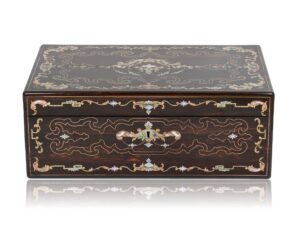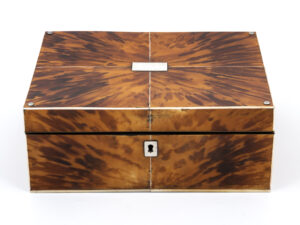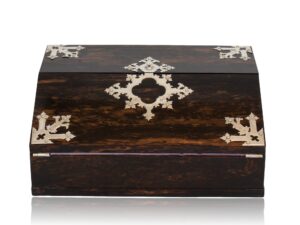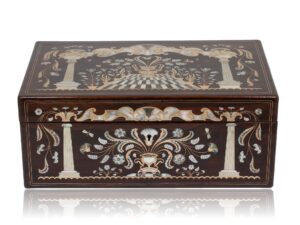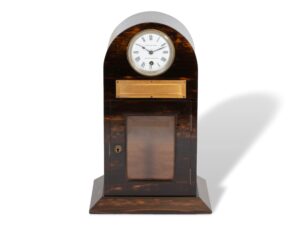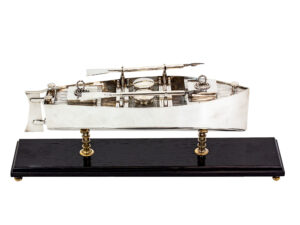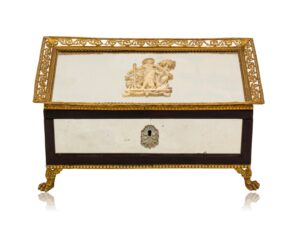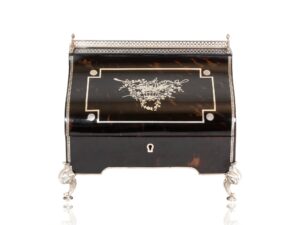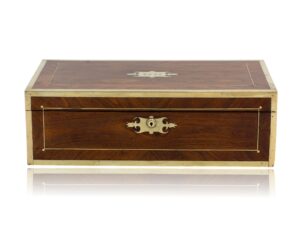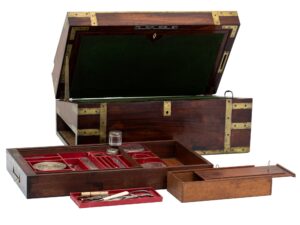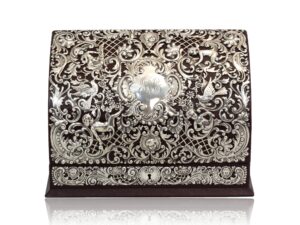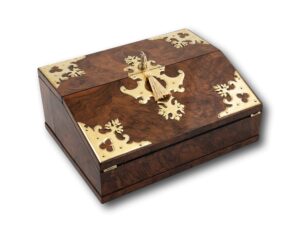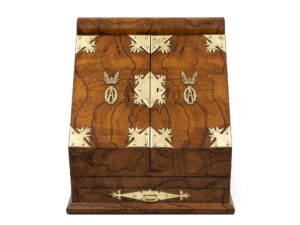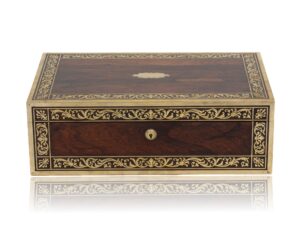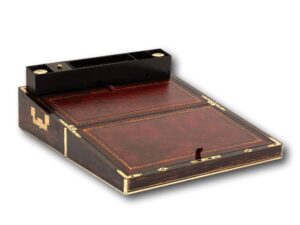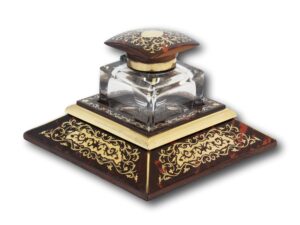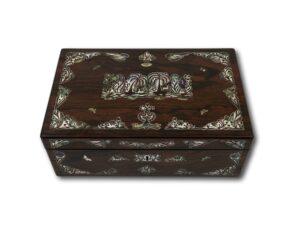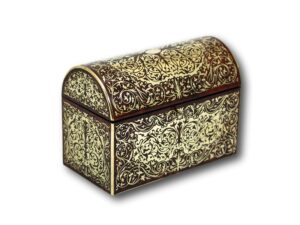Writing
The Writing Box, unlike most other boxes, symbolises great milestones in social & economic history. For many centuries, and in many cultures, portables boxes for writing materials had existed. But it was not until the late 18th century that a variation in social & economic circumstances in England made it essential to have the use of a portable desk in the form of a box which could be used on a lap or table. The Writing Box, or Lap Desk, was born! The first writing boxes symbolised intelligence, commerce & a knowledge of the world, with style and fashion being a lesser priority at this time. For around 100 years from the late 1700s, the writing box featured prominently on military expeditions, travels, libraries and in drawing rooms. Famous literature, contracts, letters and postcards were written on it. The Writing Box was a personal possession, unlike the writing desk or table. By the late 1700s the Writing Box became increasingly popular due to the imminent Napoleonic wars and the popularity of travelling. They were hugely popular amongst Army Officers who used their boxes to write cherished letters to their loved ones, as well as for business. Mostly used by men, they were also a symbol of social status. During these times Travel across countries and the continents was not simple. Travellers of all kinds, as well as Military staff needed compact & strong Writing Boxes, which could stand the test of long & arduous journeys. As a result, the Military, or Campaign box was created. The Captain’s, or Campaign, Writing Box is much more mechanically complex and therefore more intriguing! It’s generally brass-bound, has secret drawers, candlesticks & a screw-down mechanism which comes out the bottom of the box and fixes it to a piece of furniture or ships deck, not only for security purposes but for possible rough voyages. Boxes we come across of this style are rarely the same in terms of arrangement of secret compartments & drawers, adding to their character.
Writing
The Writing Box, unlike most other boxes, symbolises great milestones in social & economic history. For many centuries, and in many cultures, portables boxes for writing materials had existed. But it was not until the late 18th century that a variation in social & economic circumstances in England made it essential to have the use of a portable desk in the form of a box which could be used on a lap or table. The Writing Box, or Lap Desk, was born! The first writing boxes symbolised intelligence, commerce & a knowledge of the world, with style and fashion being a lesser priority at this time. For around 100 years from the late 1700s, the writing box featured prominently on military expeditions, travels, libraries and in drawing rooms. Famous literature, contracts, letters and postcards were written on it. The Writing Box was a personal possession, unlike the writing desk or table. By the late 1700s the Writing Box became increasingly popular due to the imminent Napoleonic wars and the popularity of travelling. They were hugely popular amongst Army Officers who used their boxes to write cherished letters to their loved ones, as well as for business. Mostly used by men, they were also a symbol of social status. During these times Travel across countries and the continents was not simple. Travellers of all kinds, as well as Military staff needed compact & strong Writing Boxes, which could stand the test of long & arduous journeys. As a result, the Military, or Campaign box was created. The Captain’s, or Campaign, Writing Box is much more mechanically complex and therefore more intriguing! It’s generally brass-bound, has secret drawers, candlesticks & a screw-down mechanism which comes out the bottom of the box and fixes it to a piece of furniture or ships deck, not only for security purposes but for possible rough voyages. Boxes we come across of this style are rarely the same in terms of arrangement of secret compartments & drawers, adding to their character.
Showing 1–18 of 282 resultsSorted by latest
-

Georgian Blonde Tortoiseshell Writing Box Lund
-

Coromandel Silver Mounted Writing Box Betjemann
-

Inlaid Writing Box Hausburg
-

Coromandel Letter Box Clock Chapman and Leuchars
-

Silver Plated Novelty Boat Inkstand Desk Set
-

French Palais Royal Musical Writing Box
-

Tortoiseshell and Silver Stationery Box William Comyns
-

Georgian Kingwood Writing Box David Edwards
-

Captains Campaign Military Writing Box Compendium
-

Silver Stationery Box Black Starr & Frost
-

English Burr Walnut Writing Box Betjemann
-

Impressive Olivewood Stationery Cabinet Betjemann and Leuchars
-

Antique Rosewood Writing Box William Chrisp
-

Antique Coromandel Writing Box Fisher
-

English Boulle Inkwell JC Vickery
-

Antique Victorian Writing Box Hausburg
-

Antique English Boulle Stationery Box Leuchars & Sons
